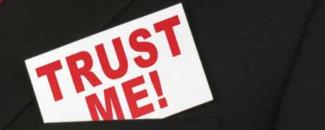Ultimately the board is responsible for maintaining a company's corporate governance standards, but a number of cases handled by Hong Kong's Independent Commission Against Corruption (ICAC) indicate that some directors in Hong Kong need to be reminded of this fact
‘It takes 20 years to build a reputation and five minutes to ruin it. If you think about that you'll do things differently.’ Warren Buffet's well known adage serves as useful advice for directors in Hong Kong. Some recent cases handled by the ICAC and enforcement cases handled by the Securities and Futures Commission (SFC) highlight the failure of company directors to maintain personal integrity and ethics and properly discharge their duties. It is important to bear in mind that these corporate governance failures do not just affect the directors and the companies concerned, they can seriously affect the reputation of the market as a whole.
Reputational risk
The Hong Kong stock market is the envy of financial centres around the world as the number and size of public listings
of largely mainland Chinese companies and other foreign companies has soared in recent years. According to Hong Kong Exchanges and Clearing Ltd (HKEx), Hong Kong has finished in the top five stock markets globally in terms of IPO funds raised for 10 straight years, a distinction only shared with the New York Stock Exchange. Hong Kong also finished first in the World Economic Forum's Financial Development Index 2011, the first time an Asian city has topped the rankings.
Moreover, the future for the Hong Kong exchange looks bright. It is fast becoming the leading financing market for world mineral and exploration companies and a major base for hedge funds. Hong Kong is also the first offshore yuan business centre to launch investment products denominated and cleared in the Chinese currency, the renminbi. It is also the first and largest market outside mainland China for Renminbi bonds, otherwise known as dim-sum bonds.
Hong Kong's reputation as a premier global financial centre, however, depends upon investor confidence in corporate governance standards. 'An effective corporate governance system is essentially a set of mechanisms that cultivate and maintain the trust between capitalists [the capital providers] and entrepreneurs, without which the capitalists will walk away and there won't be a thriving capital market, let alone a global financial centre,’ says Professor Wayne Yu, who specialises in corporate governance issues at the Graduate School of Business at Hong Kong Polytechnic University.
Recent cases of corporate governance failings among directors handled by the ICAC have shown that the courts
in Hong Kong recognise this. They have condemned such failures as tarnishing the image of Hong Kong as an international financial centre and have tended to impose harsh sentences to maintain a level playing field in the market.
Moreover, as Dr Caryle Tsui, the Chief Executive Officer of the Hong Kong Institute of Directors (HKIoD), points out, the Hong Kong economy is still comprised of a large number of non- listed companies and small and medium- sized enterprises which could become listed one day. It is important that the message on corporate governance reaches these enterprises too. 'They should be taught about corporate governance, to prepare them for future expansion’, says Dr Tsui.
Corporate governance culture
Good corporate governance is not just about having the right policies and procedures in place, it is also about having these embedded into the culture of the organisation from the top down. This is where directors come into the picture.
The Corporate Governance Review 2011, published by the auditing firm BDO, found that compliance with disclosures in corporate governance reports on how internal controls and risk management had been conducted fell short of expectations in the 232 major Hong Kong listed companies in the Hang Seng Composite Index in 2011.
‘Our study revealed more listed companies failed to fully comply with the related regulations especially in respect of providing disclosures on their practices,’ said the BDO study, the sixth consecutive review of the corporate governance practices of Hang Seng Composite Index companies. The findings are based on 40 survey questions using information disclosed in the annual reports of the companies.
Moreover, in the CLSA Corporate Governance Watch 2010, Hong Kong slid back to second place after having dethroned Singapore for the first time in 2007. 'The quality of continuous disclosure of material events has been found wanting,’ the report said. The disclosure of material events, of course, has every relevance to the conduct of company directors and understandably is a major concern for regulators.
Hence it is no coincidence that in a review of the listing rules and the Corporate Governance Code undertaken by HKEx and published in its Consultation Conclusions in October 2011, the resulting new Corporate Governance Code was substantially expanded. The amendments, most of which took effect on 1 April 2012, include additional clarification of the duties of directors and their ultimate responsibility to the company.
These amendments also stress the importance of company directors discharging their duties and the disciplinary actions HKEx may exercise if they fail to do so. HKEx also encourages directors to refer to the Companies Registry's and HKIoD's guidance on directors’ duties which provide useful and practical guidance to directors.
Three ICAC cases
Directorships are not personal wealth- generating schemes for anyone fortunate enough to be invited onto a board. This should, of course, be a statement of the obvious, but a number of cases handled by the ICAC nevertheless indicate that some directors need to be reminded of this fact.
Company directors are expected to serve as the leaders of their companies. They are expected to practice ethical leadership, implement and maintain strong governance practices and uphold their personal integrity, especially when they, in their specific role and function, encounter challenges and risks associated with corruption, fraud, malpractice or other unethical behaviour which could, almost overnight, erode any business success and tarnish the hard-earned reputation of the company in the long run.
The three ICAC cases highlighted below demonstrate the consequences of unethical practices, including: embezzlement and misappropriation of corporate funds; accepting or offering advantages; fabricating documents; conspiracy to exaggerate company's performance; misuse of insider information and conflicts of interest.
Case 1. Three people, including a former executive director of a listed company, were jailed for their respective roles in
a scam involving corruption and insider dealing in relation to the purchase of shares. The former executive director and the co-defendants used the funds of an investment company to buy 15 million shares of a listed company. The profit from the resulting rise in the share price of the company was then shared amongst the defendants.
Case 2. The former chairman of a listed company was charged by the ICAC and eventually sentenced to three years’ imprisonment for embezzlement and fraud to the tune of HK$63 million. This case also involved several other senior executives who collaborated in the fraud. They published a large number of false statements, including in the company's annual report, to cover their tracks and hide the misappropriation of corporate funds. The former chairman, who was subsequently disqualified from being a company director for eight years, pleaded guilty to six charges, including three charges of conspiracy to defraud, one of conspiracy to steal, one of theft and one of dealing with the proceeds of an indictable offence.
Case 3. Two former executives of a listed company were charged by the ICAC and sentenced to four years’ imprisonment for their conspiracy to defraud the company and its subsidiaries through bogus agreements. The former chairman and the former executive director dishonestly engaged, without the knowledge of the board, two contractors to sign three consultancy agreements worth HK$12 million with a subsidiary of the listed company. In reality, the contractors, under the control of the two former executives, never offered any consultancy services at all.
In these three cases, the directors placed their personal interests ahead of those of the company and its shareholders. Hong Kong's non-statutory Guidelines on Directors' Duties (available on the website of the Companies Registry), spell out clearly that directors must never allow their personal interests to conflict with those of the companies and they must not use their position as a director to gain any advantage for themselves. Avoiding conflicts of interest is also a requirement of the listing rules.
The directors were also guilty of other violations, including breaches of the Codes on Takeovers and Mergers and Share Repurchases administered by the SFC and the Prevention of Bribery Ordinance (POBO). Under the POBO, the maximum penalty for committing a bribery offence or the use of false documents with intent to deceive one's company is a fine of HK$500,000 and an imprisonment of seven years.
Best practice recommendations
You may ask how these directors, who were empowered to enhance the ethical governance of their companies, ended up becoming the orchestrator of unethical acts against the company. It may be that some company directors engage in unethical acts simply because they have low personal ethical standards and they disregard their own legal obligations. In some cases they may not have an adequate understanding of, or respect for, the relevant legislation, regulatory guidelines and codes of ethics regulating their actions and decisions. Some of them may not have a clear understanding of the severity of the consequences of their actions.
It is the responsibility of directors to fully understand their duties and to continuously identify and assess the challenges and risks facing boards, fellow directors and management teams. The most common ethical challenges company directors face can be broadly classified into five categories:
- ethical challenges related to investments
- collusion among management
- conspiracy among employees
- undesirable association with outside parties like suppliers and contractors, and
- secret dealings with clients.
The audit committee within the company can help to mitigate risks in some of these areas, such as generating a list of specific questions to go through with the management. This exercise would at the very least ensure the company directors have addressed the issues in question and should spur appropriate action.
Apart from the above measure, other possible best practices recommended by the ICAC to strengthen the monitoring role of company directors include:
- exercising due diligence
- having a good mix of board directors that in sum ensures a balanced diversity of relevant experience and knowledge
- segregation of duties especially between chairman and chief executive officer
- strengthening internal controls
- setting up relevant committees, and
- cultivating sensitivity to warning signs (that is be vigilant and watch for warning signs embedded in corporate performance and other indicators).
Even the most meticulous rules and stringent internal controls are no guarantee against corporate governance failure, so it is important that company directors promote an ethical corporate culture within the corporation. Directors must 'walk the talk’ both on a personal and corporate level. They should remember that they are the leaders of their companies, and, as management guru Peter Drucker, Professor of Social Science and Management, Claremont Graduate University, US, points out, 'management is doing things right, leadership is doing the right things.’
The Hong Kong Ethics Development Centre, Independent Commission Against Corruption
The Hong Kong Ethics Development Centre of the ICAC is tasked to promote business and professional ethics in Hong Kong as the first
line of defence against corruption. If you are interested in using its services to strengthen the corporate governance of your company, please visit its website: www.icac.org.hk/ hkedc, or call: 2587 9812.
SIDEBAR: Insider dealing
The non-executive director of a Hong Kong listed firm was recently sentenced to five months imprisonment, suspended for two years and fined HK$50,000 after being found guilty of pocketing a gain of HK$80,000 from insider dealing on privileged information.
The director bought 4,000 shares the same day after he heard from the company CEO at a board meeting about a deal whereby a substantial shareholder would offload its shares and a general offer by another party for all shares in the company that would value the shares 25 percent above the prevailing market price.
The defendant pleaded not guilty at the trial. He claimed to be intoxicated and to have forgotten his role as an independent non- executive director, but maintained that he had no intent to profit from his trading when he bought the shares. The judge rejected all his claims and convicted the defendant of insider dealing.
Source: Securities and Futures Commission


